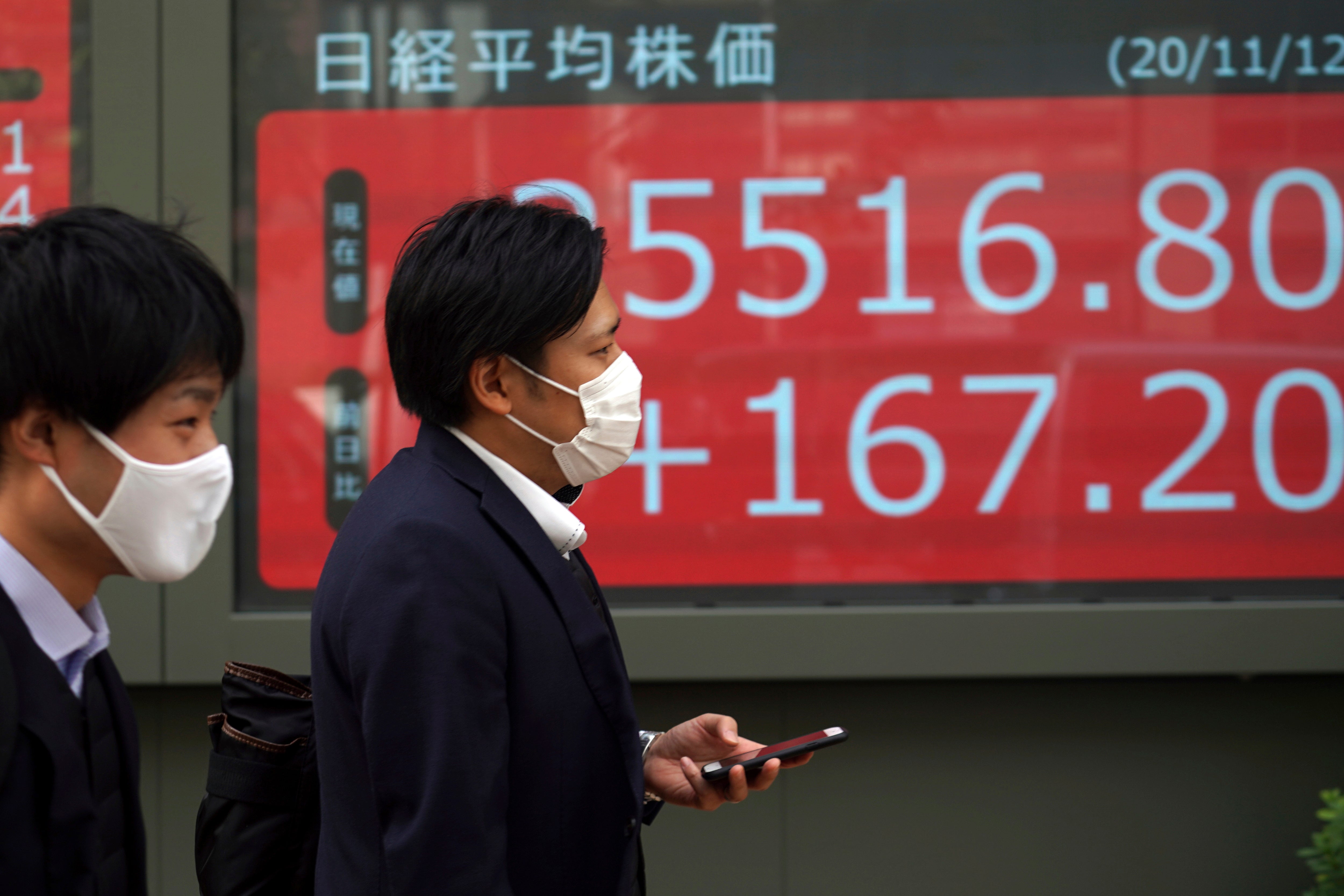Asian shares slip on faltering hopes for COVID vaccines
Asian shares and U.S. futures are mostly lower after big technology shares staged a comeback overnight, pushing Wall Street benchmarks higher

Your support helps us to tell the story
From reproductive rights to climate change to Big Tech, The Independent is on the ground when the story is developing. Whether it's investigating the financials of Elon Musk's pro-Trump PAC or producing our latest documentary, 'The A Word', which shines a light on the American women fighting for reproductive rights, we know how important it is to parse out the facts from the messaging.
At such a critical moment in US history, we need reporters on the ground. Your donation allows us to keep sending journalists to speak to both sides of the story.
The Independent is trusted by Americans across the entire political spectrum. And unlike many other quality news outlets, we choose not to lock Americans out of our reporting and analysis with paywalls. We believe quality journalism should be available to everyone, paid for by those who can afford it.
Your support makes all the difference.Stocks fell back across Asia on Thursday after gains for big technology shares pushed most Wall Street benchmarks higher. U.S. futures also declined.
Excitement over news of potentially effective vaccines for COVID-19 has been tempered by concerns over the logistical challenges of ensuring access to billions of people. Meanwhile, caseloads are rising, leading governments to re-instate restrictions on business and other activities to battle the pandemic
“Vaccine trades reversed to give way to ‘stay home' trades," as shares of technology companies and others that do well when people stay home and work remotely rallied, Mizuho Bank said in a commentary. But it added, “Fact of the matter is, progress on vaccine development is at worst two steps forward one step back, and not one step forward and two steps back on a sustained basis."
Tokyo's Nikkei 225 index gained 0.7% to 25,520.88 despite a report that machinery orders fell in September, suggesting weakness in corporate investment. The benchmark has been trading near 30-year highs despite a resurgence of COVID-19 cases that has officials urging people to stay home over the holidays.
The mood was more somber elsewhere in Asia.
Hong Kong's Hang Seng index fell 0.3% to 26,145.30 and the Shanghai Composite index declined 0.2% to 3,334.20. In Seoul, the Kospi gave up 0.2% to 2,480.10. Australia's S&P/ASX 200 slipped 0.5% to 6418.20.
Overnight, the Dow Jones Industrial Average edged 0.1% lower, to 29,397.63, dragged back by weaker prices for companies like American Express and Walt Disney, that had shot up this week after news of a potentially successful vaccine sent travel, entertainment and tourism companies surging.
The Dow declined shortly after news crossed that New York would put restrictions on bars, restaurants and gyms as COVID-19 infections rose in the state.
Markets have been riding a wave of relief over hopes for a potential vaccine to beat back the pandemic. The S&P 500 rose 0.8%, to 3,572.66 and is just 8 points below the record high it set in September. The technology-heavy Nasdaq composite rose 2%, to 11,786.43.
While several significant risks remain for Wall Street broadly, the optimistic case that investors are embracing is that one or more coronavirus vaccines could help corral the virus by the second half of next year, encouraging people to return to life as it was before the pandemic.
All that economic activity would come on top of the tremendous aid that the Federal Reserve and other central banks around the world are pumping into the economy through very low interest rates and massive purchases of bonds. Hope also remains that the U.S. government may eventually deliver some form of support for the economy, though its total size would likely be smaller than if Democrats had swept this month’s elections.
Strategists along Wall Street are raising their forecasts for stock prices on expectations that political control of Washington will remain split between the parties. Republicans look set to keep the Senate, as long as runoff elections go their way in Georgia in January, while Democrats will hold the House of Representatives.
Democrat Joe Biden has clinched enough electoral votes to win the White House, clearing some of the uncertainty that weighed on the market through the vicious campaign. Even though President Donald Trump has refused to concede, investors are ignoring his complaints so far. They’re instead working on the assumption that a split Washington under Biden could keep tax rates low while offering more steady and predictable policies.
Those expected results helped push strategists at Goldman Sachs to raise their forecast for the S&P 500 at the end of this year to 3,700 from 3,600. That would imply another 4.4% climb from Tuesday’s closing level. They expect it to rally another 16% through 2021. But the biggest driver for that is the hope for a return to normal life, rather than what happens in Washington.
In other trading, benchmark U.S. crude oil picked up 2 cents to $41.47 per barrel in electronic trading on the New York Mercantile Exchange. It climbed 9 cents to $41.45 on Wednesday.
Brent crude, the international standard, lost 1 cent to $43.79 per barrel.
The U.S. dollar weakened to 105.23 Japanese yen from 105.42 yen. The euro was almost unchanged at $1.1775.
___
AP Business Writers Stan Choe and Ken Sweet contributed.